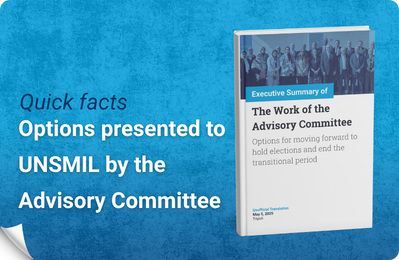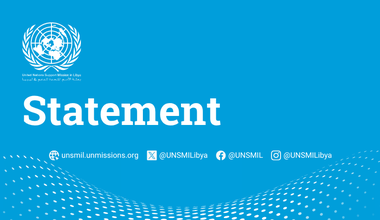Basirah: 50 Libyan media professionals join UNSMIL workshop on A.I. tools for the newsroom
TRIPOLI—Artificial intelligence tools can help journalists deepen their research, fact-check more efficiently, and save time on tedious tasks, freeing up more time for creativity.
How?
For the first event of the Basirah (بصيرة) professional development programme for journalists, the United Nations Support Mission in Libya invited Google to teach just that.
Fifty Libyan journalists and other media professionals, including media professors and students, joined the online workshop on 21 May, which was presented by Pamela Kesrouani, a teaching fellow for Google News Initiative-MENA and a former adjunct instructor at the American University in Dubai and France24 journalist. Participants—20 of whom were women—tuned in from cities in the west, east and south of Libya.
During the workshop, participants learned how to use Google A.I. tools to assist with research, including NotebookLM and PinPoint. NotebookLM helps users analyse complex documents, including by creating summaries, answering questions, and generating insights. Pinpoint combines the power of a search engine with optical character recognition and speech-to-text technologies to search through scanned PDFs, images, handwritten notes, emails and audio files.
Kesrouani walked the group through Fact Check Explorer, an A.I. tool that makes it easy for journalists to determine whether questionable claims or images have been investigated by independent fact-checking organizations across the world and the outcomes of those investigations. The tool also helps journalists understand the context of a claim, including where it originated.
She also taught participants tips for using Gemini, Google’s most advanced A.I. tool, which works similarly to OpenAI’s ChatGPT, to automate mundane work, saving journalists time and preserving brain power for more complex, creative work. For example, many journalists use Gemini to help with translation, transcription, dubbing, and captioning. Some newsrooms, such as FOX Sports, have also optimized their archival libraries by using Gemini to automate tagging by extracting metadata from videos, images, audio files, and text. This allows journalists to search for what they need using natural language without having to remember exact keywords.
Participants said they expected the tools would prove useful in their work, emphasizing the importance of adhering to journalistic ethics when using AI, and expressed interest in further training.
This type of training is important to help Libyan journalists update their technological, said Suad Kashlout, a writer from Zlinten, who participated in the workshop. Misinformation and disinformation are rampant in Libya, she said, and journalists have limited access to resources.
Ismail Ali Al-Zawi, a journalist from Tripoli echoed her observations, adding that “improving the quality of journalism” in Libya is “essential for building a free and effective media that serves society and strengthens democracy.”
UNSMIL’s Basirah (بصيرة) programme aims to equip media professionals with knowledge and skills to better combat the spread of misinformation, disinformation, and hate speech. Events are ongoing. Here’s what’s coming up next:
-
28 May 2025, 2 p.m. – Online harassment: A discussion with Libyan journalists
-
4 June 2025, 2 p.m. – The impact of A.I. on politics and democracy
-
19 June 2025, 11 a.m. – How to protect yourself from online harassment
-
24 June 2025, 1 p.m. – Tactics of media influence during wartime
Dates and times may change. Sign up to stay updated and join the Basirah Facebook community.
 United Nations Peacekeeping
United Nations Peacekeeping UN
UN








